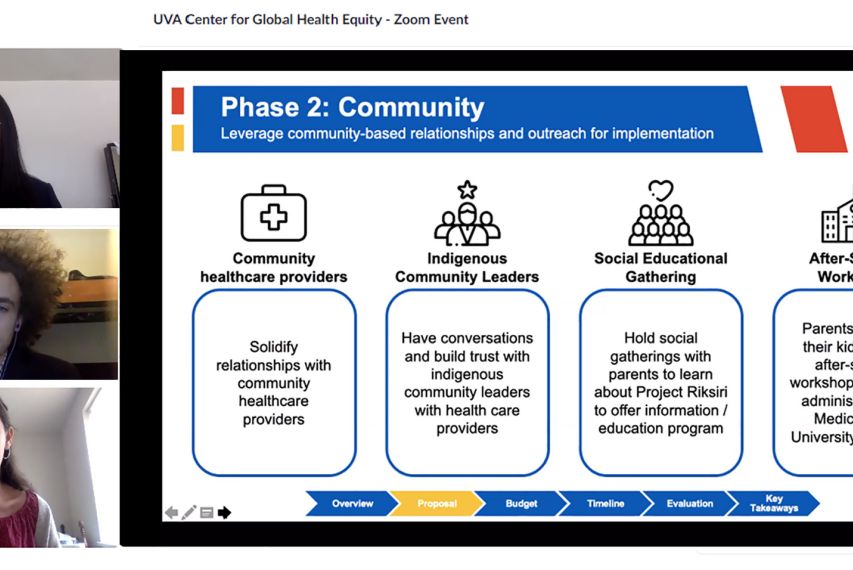For the first time since it was launched, Center for Global Health Equity held their Global Health Case Competition online. But it did not dim the enthusiasm. Almost a hundred UVA student competitors representing diverse schools and disciplines, gathered on Saturday, March 20 to address complex global health issues represented in the case competition that has been held annually since 2013.
UVA is among a small group of institutions that writes new global health cases annually. Each year, CGHE develops a case for the competition based on global health issues incorporating both primary and secondary research into the case based on feedback from a collaborative community partner. Evidence-based cases provide competition participants the unique opportunity to deliver a high-impact solution for real global health issues.
For this year, CGHE collaborated with faculty, alumni, and student global health leaders at the University San Francisco de Quito (USFQ) in Ecuador on multiple aspects of the GHCC. The partners worked with six student leaders on the CGHE Student Advisory Board GHCC Committee from the College of Arts and Sciences and the School of Engineering and Applied Science to develop “2021 Global Health Case Study: Road to Equity and Prevention in Adolescent Pregnancy in Ecuador” a realistic, rigorous case based on priority health challenge in Ecuador.
“This competition exceeded our expectations in terms of outstanding student participation from previous years even though it was virtual,” said Rebecca Dillingham, Director of CGHE. “We are also delighted to have had the opportunity to grow and strengthen our partnership with USFQ; the contributions of the faculty and students from USFQ were exceptional.”
The winner of the case competition was Hoos for Better Health team with students from the Frank Batten School for Leadership and Public Policy, the College of Arts and Sciences and School of Nursing. The team consisted of four undergraduate and graduate students -- Jackie Chen, Benjamin Feldman, Paige Kobza, and Hellen Schmedtje.
"The 2021 GHCC was a challenging but rewarding experience of proposing a real-world solution to a global issue. We focused on bringing in different perspectives and experiences and communicating effectively; that led us to excel in our teamwork and producing the solution,” Jackie Chen, the team leader said. “I hope that more students will take this opportunity and participate in the coming years.”
Hoos for Health, a team of four students from College of Arts & Sciences and School of Engineering & Applied Science were in second place and Team 16, a group of five students from College of Arts & Sciences received third place.
Iván Palacios, who directs Global Health initiatives at the Universidad San Francisco de Quito said he was glad to have this opportunity to partner with CGHE. “Without any doubt, this activity enhanced our partnership and provided new avenues of collaboration between our institutions,” he said. “I am really committed to support the implementation of the most relevant recommendations made during the case competition.”
In addition to guiding the case writers, USFQ faculty also mentored student competitors in the week leading up to the competition holding regular zoom office hours. Palacios and Allpa Tituaña, who co-founded a student-focused initiative to address sexual health concerns for anonymous users through social media also participated in these conversations.
The 2021 judges panel included faculty from University of Virginia and University of San Francisco Quito, the chair of the 2020 GHCC, and former Minority Health International Research Training (MHIRT) fellows associated with the UVA-USFQ partnership.
For the winner, the judges considered how well the teams understood the problem, how practical and acceptable their recommended interventions were, how well they delivered their presentation and how effectively they answered questions during the Q&A session.
“In the end, a clear consensus emerged about the team that had the best balance of problem analysis, recommended strategies, and presentation,” said Chris Colvin, associate professor, Public Health and one of the judges on the panel. He also added that the judges in Ecuador were interested in speaking further with all the teams in the final round so that they might take forward a combination of some of the best ideas that came out of each of the projects.
“We look forward to building additional mentored student research experiences for students from both institutions based on the ideas sparked by this competition, and we can’t wait for our 10th annual GHCC next year,” said Dillingham.
For more information about the competitions and the winners, please visit: https://globalhealth.virginia.edu/2021-global-health-case-competition-0




